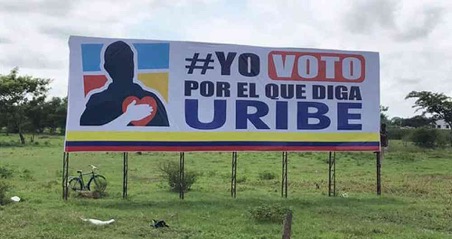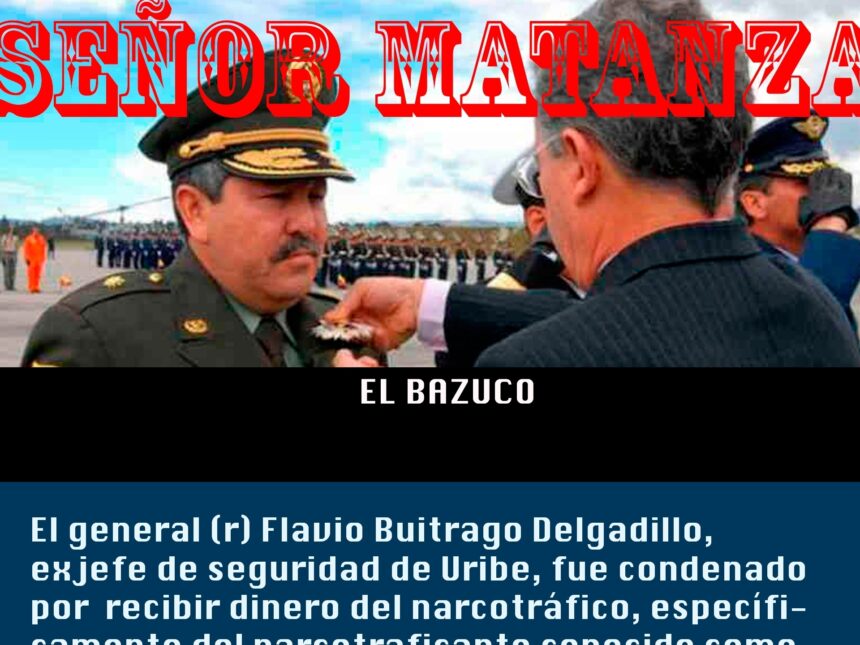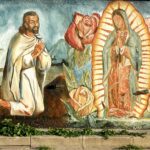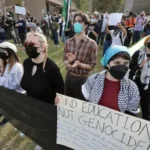Señor Matanza: A Counter-Historical Karaoke to Exorcise the Manipulation of our Conscience
Jimena Andrade, Victoria Argoty, Daniel Castellanos, Camila Cifuentes, Miguel Estupiñán, María Gamarra, Guerthy Gutiérrez, Susana Lyons, Silvia Valderrama, Esthefanny Yague, Nicolás Vargas.
Esa olla, esa mina, esa finca y ese mar,
Ese paramilitar
Son propiedad
Del Señor Matanza
Mano Negra, 1994
That crack house, that mine, that estate and that sea,
That paramilitary
Are Señor Matanza’s own
Mano Negra, 1994
After almost four years of negotiation, on August 24th 2016, the Colombian government signed a peace deal with the Fuerzas Armadas Revolucionarias de Colombia – Ejército del Pueblo (FARC-EP) [Revolutionary Armed Forces of Colombia – People’s Army]. Since the peace talks began, and up to the current moment, there has not been a single day without campaigns against the peace process being launched by right wing or far right political groups that oppose it for hate, fear and reasons of disinformation. Political groups sharing this attitude have been able to infiltrate many sectors of the government, using military and para-military structures to undermine and de-legitimate political groups, dissidents and human rights activists who do not share their views. This is how Colombia has been governed for the past several decades, and for this reason, we are one of the countries with the most unequal level of land distribution in the world: “82% of the productive land in the country is in the hands of 10% of the land owners.”[2] That concentration of land in the hands of so few people has led to the rise of private armed forces, the proliferation of poverty, the growth of the gap between the rich and the poor, and the increase of unemployment and malnutrition. More than a state based on the rule of law, nowadays Colombia is a state based on social inequality.[3]
The seeds of hatred, misinformation and fear were sown and bore fruit the results of the last Colombian presidential election in the period between 2018 and 2022. During this time Iván Duque, one of former president Álvaro Uribe’s senate partners and puppets, rose to power. At the beginning of the election cycle, Duque was a complete stranger. All that was known at that time was that he was Uribe’s handpicked successor (“he is the one Uribe recommends/stands for [chose],” as a popular poster and billboard at that time stated).[4] On the other side, those candidates, social leaders and human rights defenders who have been willing to denounce corruption and violence today face mental, emotional and physical violence from disinformation strategies, death threats, and unfounded criminal accusations. Many have paid with their lives. Right and far right wing political groups know that their most powerful ally in challenging the forces of peace and equality in the country is a campaign based on fear, which they use to numb the critical capacity of the population.

The absolute control of the three branches of power would effectively invalidate Colombian democracy, as there would not be any countervailing political force operating outside the interests of Duque’s Centro Democrático party. This will be tantamount to a dictatorship. Right now, the Supreme Court of Justice is the only entity investigating former President Álvaro Uribe Vélez for the crimes against human rights committed under his administration, as well as, for the illicit appropriation of national resources and wealth engaged in by Uribe and his cronies. Furthermore, the implementation of the peace agreement is being equally affected if there is no political will to do so. Duque’s de facto dictatorship is also likely to renege on all of the structural reforms agreed on as part of the peace agreement in Havana. Given this situation, Colombia seems likely to be entering a period of social, political and cultural decline. In this context, the brutal return of the legalization of para-militarism could be around the corner. Although it is still in force on a practical level, para-militarism keeps the same legitimacy than it had during the legislation that gave ] This same policy was promoted during his presidency with the complicity of the state, during a time when the reign of para-militarism was at its peak.
This complex political situation was reflected in Señor Matanza, a popular song from over twenty-five years ago by the band Mano Negra.[8] Its lyrics mostly talk about corruption, massacres, embezzlement and governmental impunity in a manner that closely mirrors the current political situation in Colombia. All our lives, we have been governed by the same elite, by the same land dispossession and by a reigning system of corruption that is being orchestrated by extortion, massacre or systematic murders that today are being trivialized as “issues with women” (that refer to sentimental or sexual issues involving a woman)[9] or common crime. Before the first presidential round on May 27, 2018, and facing the threat of the return of the “Democratic Security Policy,” an underground collective calling itself Señor Matanza[10] appropriated Mano Negra’s song with the goal of updating each of the song’s stanzas to reflect current events in Colombia. Given the close correlation between current events and the country’s history of repression, this process revealed to be quite simple.

One of the memes associated with the song was disseminated through on-line platforms and Whatsapp:
- One of the massacres that will take Uribe down—the director of the eight years’ orchestra—will go down. Will go down.
- In the meantime: “a mi ñero llevan pál monte”
- ‘Señor Matanza’
- ¿How did the Aro massacre happened in Antioquia?
- The raid took place in El Aro, Antioquia on October 22nd, 1997 four days before the local and regional elections.
- He decides who will
As a collective, Señor Matanza constituted itself as a kind of counter-historical karaoke machine through an assembled video archive,[11] where this and other videos with a strong political resonance were reproduced through amateur performance and shared via Whatsapp. Here the image of “Señor Matanza” functions as a symbol for, or embodiment of, Colombia’s forces of reaction. Given the grotesque nature of the political situation in Colombia, it is hard to know if the concept of “karaoke” (people mindlessly lip-syncing to someone else’s song) works as a metaphor for the general refusal to acknowledge the depths of social decomposition and barbarity taking place today, or if it stands for the fact that people are aware of it, but also refuse to take action out of ingrained submission, fear and ignorance. These uses of karaoke have a clear political intention: to generate awareness of the misinformation and media manipulation of civil society, especially in the cities, where there is no real consciousness of the consequences of war in the rest of the country.
The Señor Matanza collective staged public performances and projections of the videos throughout Bogotá,[12] and also distributed printed meme flyers to people passing by.[13]. As the collective members danced clumsily, handing out flyers and projecting videos, they also engaged the public in discussions about the various political issues referenced in those materials. It is clear that the participants’ music, video and dance were an appealing factor on the streets. At the beginning of each performance, people could not understand what was happening. But as the audience took the time to watch the video and read the flyers, they gained a clearer sense of the many abuses committed by the present and past governments. The projected videos have a temporality which responds to the movement of the dance and the scale of the public space in which they are projected. But the flyers, which provide a more detailed explanation of the facts, appeal to another temporality and open up the possibility of generating awareness on our political reality and our responsibility as members of civil society. Señor Matanza is the wooden horse of Troy, because it uses the power of sound and image to gain the attention of people across the political spectrum.
In such a polarized country with a strong capacity for the violent repression of any form of dissent, the absurd gesture of dancing badly to music videos is able to open a small crack in an otherwise tightly controlled public consciousness. The flyers and the videos enable the observers to reflect on their own role as voters in governmental elections. By bringing the repressive figure of Señor Matanza into the present and comparing it with the turmoil of the mid-1990s, we are able to provide a crucial historical perspective on the current scenario in Colombia, which is defined by the daily murder of human rights defenders, water and land activists, women, young people, members of peasant communities, indigenous people (as in the case of those murdered in the Cauca in an indigenous reservation), and members of Afro-descendant communities (as in Quibdó). Those communities who were directly affected by the para-military conflict, and who voted for the hope of a country in peace are now systematically persecuted by those who want to end all resistance. “Señor Matanza” (the character, not the artistic collective) and the warlords know that if they kill and silence the leaders who advocate the power of love and persistence, they could continue to subdue the population.
The Señor Matanza collective uses the mass media to challenge a culture of hatred that seeks to legitimize violent actions against feminists, the LGBT community (whom Uribe calls “non-heterosexual people”),[14] and those who fight for their rights, just because this macho culture is backed by a repressive government. While Duque’s administration does include a woman working as minister of education, she is a homophobic Christian and a defender of the “traditional family” model, who cannot stand difference. So, this is what is left to Colombia after the celebrated signing of the peace agreements: after millions of people worked hard for the transformation they promised, “Señor Matanza” won. And yet, we will remain in resistance, we will resist and fight for peace, as is our civic duty. What awaits us? What the public declarations and the actions of the congress by the Centro Democrático party have demonstrated thus far is a willingness to remain at war and a willingness to encourage a process of ongoing environmental destruction, regardless of the economic or social costs and the damage caused to the lives of so many people. In response, the Señor Matanza collective repeats: “we want you to join us dancing in the street.” So, let’s dance, but let’s dance in a way that is so awkward and clumsy that can actually bring something good out of the negative. Let’s remind that gonorrhea of “Señor Matanza,” that people do not forget, that people are worthy and that while many of us were born at night, we were not born last night!
Not even Álvaro Uribe Vélez can kill this craving I have for dancing to the rhythm of ‘Señor Matanza’
JUST LIKE COLOMBIAN BOYACOS SAY:
IF WE GET TOGETHER, WE CAN STOP THEM
Señor Matanza (Mr. Slaughter) Collective. Before the 2017 presidential elections and with the upcoming threat of a constitutional return of the extreme right to the Presidency of Colombia, a group of people coming from different backgrounds (art, history, physics, education and graphic design) decided to get organized under the name of ‘Señor Matanza’ in order to collaborate from different disciplines and possibilities to take action in the streets with a pedagogical commitment shaped as a counter-historical karaoke, dance and using memes with the purpose of taking action against the media manipulation which co-opts people’s conscience right at the moment when they have to choose those who represent them politically.
Notes:
[1] “Señor Matanza” [Mr. Slaughter] is the name of the collective which at the same time refers to all the network of politicians, to the disinformation of the mass media and to economic groups sponsoring and encouraging violence, hunger and poverty. Also, it is the name of a song performed by Mano Negra. To see the historical context of Señor Matanza in Colombia: http://interferencia-co.net/SenorMatanza.html
[2] Food and Agriculture Organization for Latin America and the Caribbean. FAO April 5, 2017. “América Latina y el Caribe es la región con la mayor desigualdad en la distribución de la tierra.” http://www.fao.org/americas/noticias/ver/es/c/879000/
[3] Colombia is a social state of inequity because in practice, it opposes what is written on the first article of the Political Constitution of Colombia, which reads: “Colombia is a social state under the rule of law, organized in the form of a unitary republic, decentralized, with autonomy of its territorial units, democratic, participatory, and pluralistic, based on the respect of human dignity, the work and solidarity of the individuals who belong to it, and the prevalence of the general interest.” Available at: https://constituteproject.org/constitution/Colombia_2015?lang=en#5
[4] The former president Álvaro Uribe Vélez (2002-2010) manipulated the public opinion at the elections, supporting the presidential candidacy of Ivan Duque for the 2018-2022 term and achieving his appointment. Uribe has been the political mentor of Duque and also exerts influence upon the
[7] For further references about the Democratic Security policies of Álvaro Uribe Vélez see: http://www.corteidh.or.cr/tablas/r33458.pdf
[8] The music video can be seen here: https://youtu.be/eBB7HeShhAg
[9] Despite the exponential increase in the systematic assassination of human rights leaders and social leaders in Colombia, the Minister of Defense of Colombia (2015-2018) during Santos’ government, Luis Carlos Villegas, trivialized this serious issue by stating that “there is no organization that is killing social leaders, but that these deaths obey to Líos de Faldas (issues with women). For more information see: https://www.elespectador.com/noticias/politica/asesinatos-de-lideres-son-por-lios-de-faldas-ministro-de-defensa-articulo-728893
[10] As defined on their Facebook page Señor Matanza is, “a group of citizens that demands life guarantees in Colombia. We reject corruption as we reclaim the vital rights of coexistence that should be guaranteed by the state: housing, health, food, education, labor, information, protection, participation. The aforementioned rights are not granted due to the political exclusion of the population that is sustained by the fraudulent control of the electoral apparatus, the distortion of the truth through biased mass media, the absence of protection of the population through the impunity of the judicial system and by the repressive nature of the police with a mentality of the internal enemy.” For more information see: https://www.facebook.com/nuncamasmatanza/ https://vimeo.com/senormatanza
[11] Available at: https://vimeo.com/267675689
[12] To see some actions performed on the street: https://vimeo.com/310381621 / https://vimeo.com/310380453 / https://vimeo.com/310380115 / https://vimeo.com/310382621
[13] Available at: https://redcsur.net/es/2018/06/04/senor-matanza-ante-el-balotaje-en-colombia/
[14] Days after different demonstrations for the right of sexual diversity, some transsexual activists/protesters were beaten in the Fontibón neighborhood of Bogotá, where five men entered to a beauty salon owned by transgender stylists beating and torturing the persons who were in the salon and destroying the establishment afterwards.







